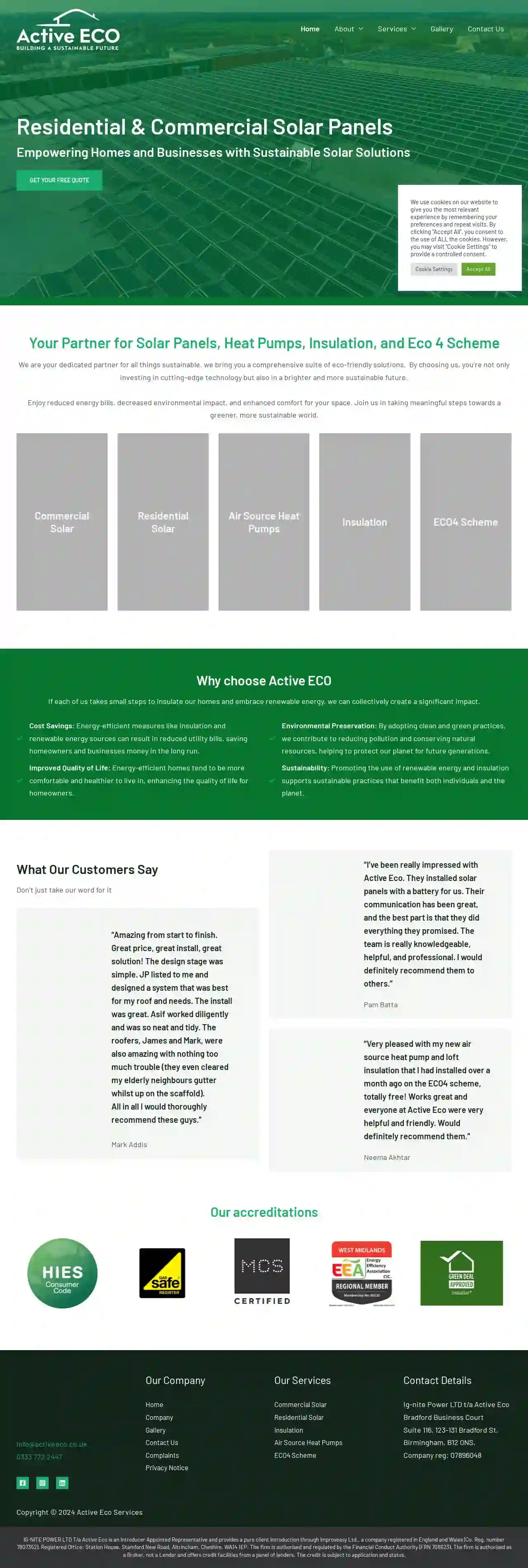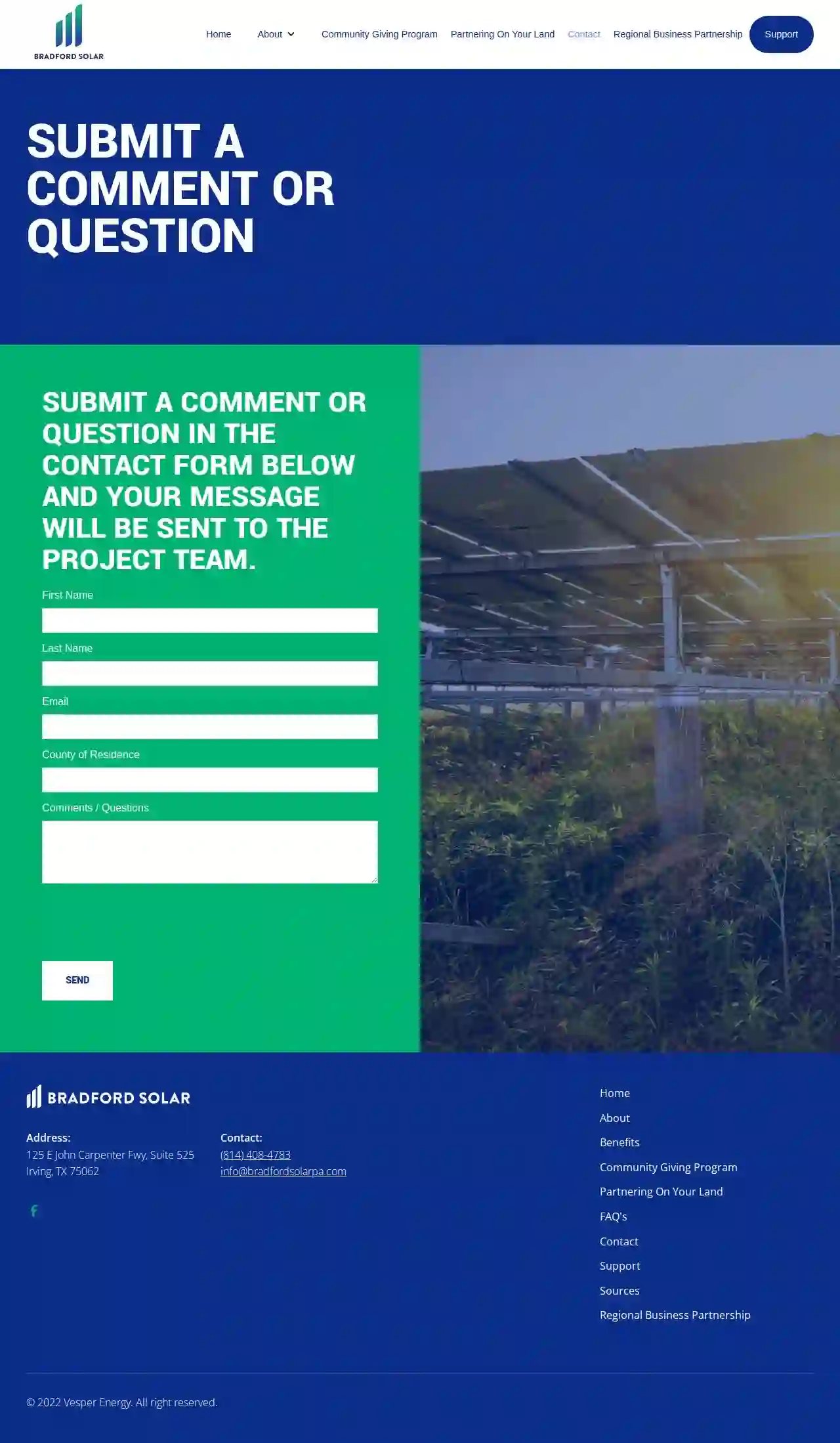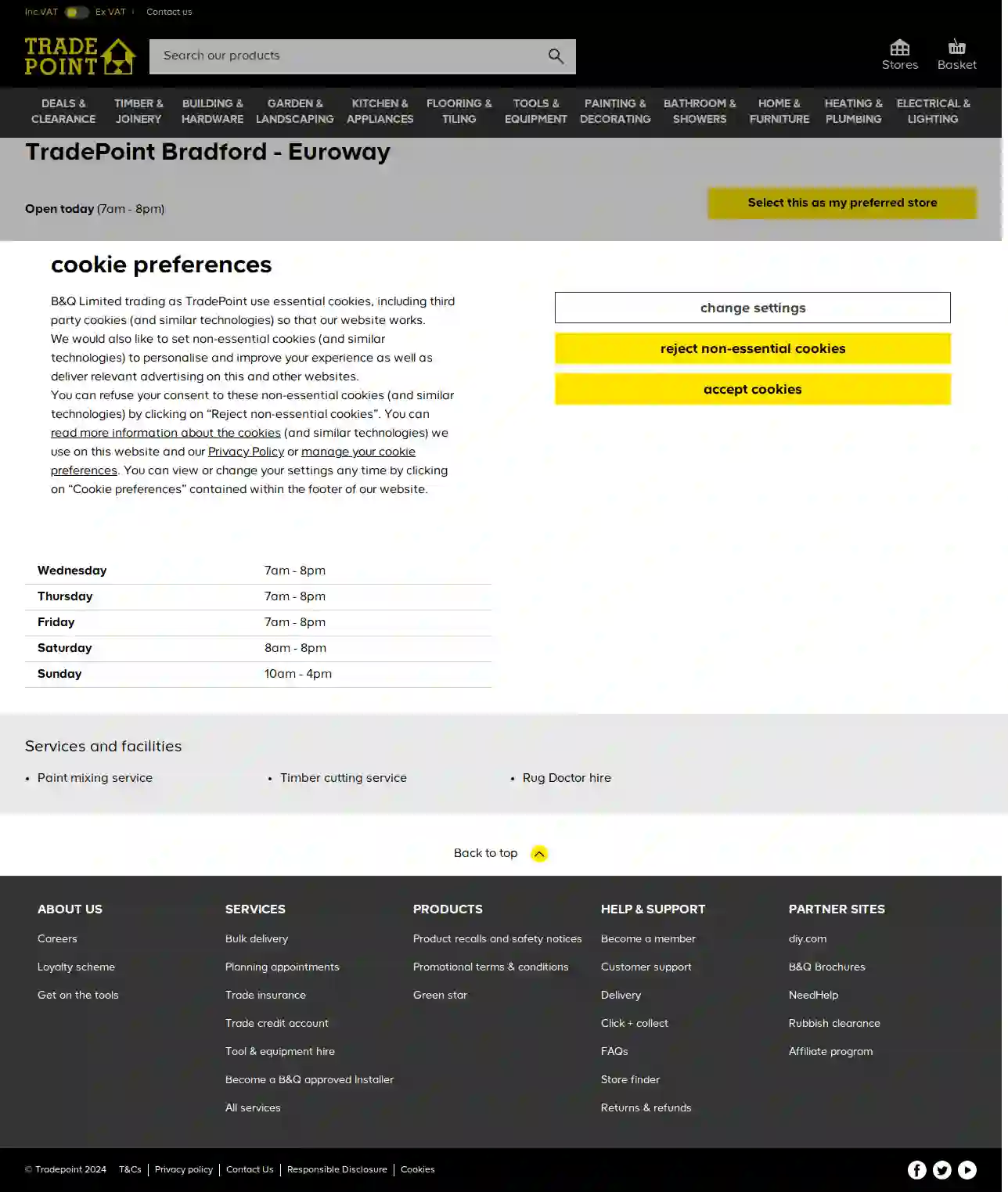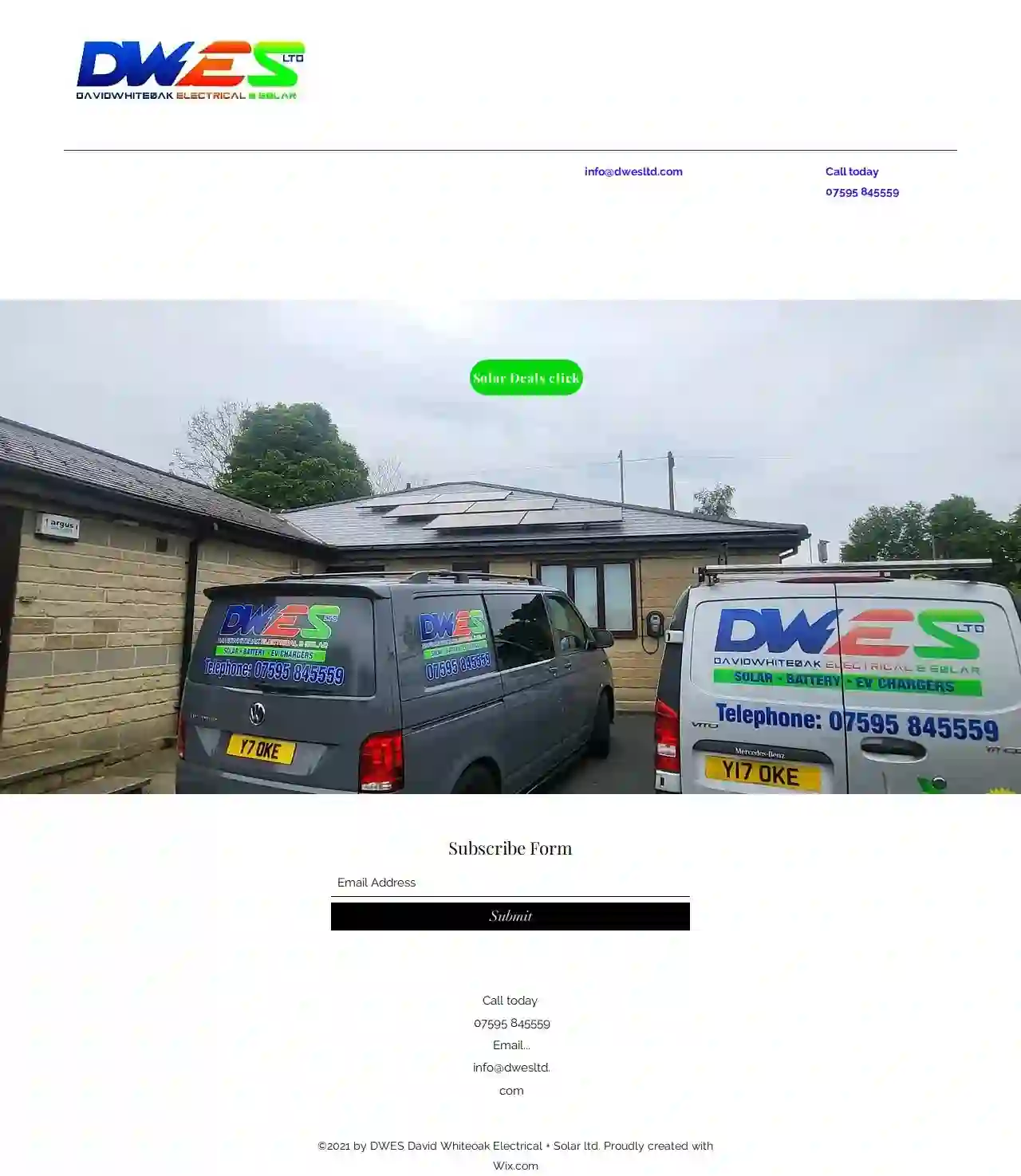Solar Installers Bingley
Top Solar Installers in Bingley
Get 3 FREE Solar Energy Company quotes for your project today! Compare profiles, reviews, accreditations, portfolio, etc... and choose the best deal.

Sonic Direct
4.2928 reviewsSonic Direct, Ingleby Road, Bradford, BD8 9AN, GBSonic Direct is a leading online retailer of home appliances and electronics. With a wide range of products from top brands, we offer competitive prices, excellent customer service, and a hassle-free shopping experience. Our mission is to provide our customers with the best possible service, ensuring they receive the right product at the right price. We are committed to delivering exceptional customer service, and our team is always available to help with any queries or concerns. With our extensive product range, competitive pricing, and excellent customer service, Sonic Direct is the perfect destination for all your home appliance and electronics needs.
- Services
- Why Us?
- Accreditations
- Gallery
Get Quote
Active Eco
519 reviewsSuite 116, 123-131 Bradford St, Bradford Business Court, Birmingham, B12 0NS, GBEmpowering Homes and Businesses with Sustainable Solar Solutions. We are your dedicated partner for all things sustainable. We bring you a comprehensive suite of eco-friendly solutions. By choosing us, you’re not only investing in cutting-edge technology but also in a brighter and more sustainable future. Enjoy reduced energy bills, decreased environmental impact, and enhanced comfort for your space. Join us in taking meaningful steps towards a greener, more sustainable world.
- Services
- Why Us?
- Accreditations
- Our Team
- Testimonials
- Gallery
Get Quote
Bradford Solar
125 E John Carpenter Fwy, Suite 525, GBBRADFORD Solar is a 100-megawatt (MW) solar project being developed by Vesper Energy. The project will consist of solar panels installed on 800 acres of privately-owned land in Bradford County. Commercial operation is expected by the end of 2025. This project will generate enough clean, renewable energy to power more than 10,000 Pennsylvania homes. The project will benefit the local, regional, and state economies through creation of short and long-term employment opportunities as well as new, reliable sources of tax revenue for Bradford County. Bradford Solar creates a new source of revenue that supports the most essential elements of the community, including schools, infrastructure, non-profit organizations, and local government. All community members will experience benefits through the increased tax revenue for Bradford County. The beautiful open land of Pennsylvania is preserved and protected by solar. From agriculture land to the green rolling hills, rivers and creeks, clean energy protects the picturesque natural spaces we all love to look at and live in. Learn more about how Bradford Solar will help preserve this legacy of beauty by protecting the land for future generations.
- Services
- Why Us?
- Our Team
- Gallery
Get Quote
JMG Renewables
4.52 reviewsBradford, GBJMG Renewables are Renewable Energy Engineers based in Bradford, West Yorkshire, providing services across the UK. With over 34 years in the industry, we've built a comprehensive range of services, from air source heat pumps and hot water systems to hybrid heating systems and solar PV. Why choose JMG Renewables? FAST RESPONSE : Call us on 07863 846 157 or 0747 4963 059 and one of our qualified engineers will be at your premises usually within the hour. SAME DAY REPAIRS : Most emergencies require immediate action, which is why we offer same day call out and repair services. FLEXIBLE FINANCE : Can't afford a lump sum? No problem. Simply pay off your new boiler or central heating system in small monthly payments. NO INFLATED RATES : Set costs for set services mean that you don’t have to pay per hour if the job is more complex. FIXED PRICES : We believe in offering our clients throughout the UK with the most affordable services. 1 YEAR WARRANTY : Our one year warranty means you can rely on us getting the job done right the first time around. HEAT PUMPS Heat pumps are up to 300% efficient*. With energy prices on the rise, we are looking for alternative heating options for our homes - solutions that offer real ‘fuel security’ giving you more control of your energy costs. The good news is that heat pumps are much more efficient than even the most economical fossil fuel boiler, so they provide a real alternative to oil heating. In fact, a heat pump is up to 300% more efficient than an oil boiler*. UNIQUE HYBRID SYSTEM The Daikin Altherma hybrid heat pump is a unique combination of a high-efficiency gas combi boiler and renewable energy air-to-water heat pump. Unlike other available boiler-heat pump combinations, it works in series rather than in parallel. This means the flow of one can feed into the return of the other in certain economical operating modes. UNDERFLOOR HEATING & AIR SOURCE HEAT PUMPS Underfloor heating is a great partner to an air source heat pump. The efficiency of an air source heat pump increases as the required flow temperature decreases. Put simply, this means that the cooler you can run the system, the less it costs to operate. We will design and install all your underfloor heating needs from retrofit, new build floor screed to tiling. Boiler Upgrade scheme (BUS) GO GREEN AND GET PAID Click Here Important info: MCS registered: APH47263 Gas reg number: 877 VAT reg number: 516 121585 Trust Mark 1879828 ©2020 JMG Renewables Web design by SimplyNKS Design
- Services
- Why Us?
- Accreditations
- Gallery
Get Quote
Solar Rush Ltd
15 Hastings Avenue, Bradford, BD5 9PR, GBAt Solar Rush, we are passionately devoted to crafting innovative, eco-conscious energy solutions precisely tailored to meet your needs. Our vision is one where renewable energy takes center stage, ushering in a sustainable world while reducing carbon footprint. We are devoted to crafting innovative solutions tailored to meet your needs. Office Location: 15 Hastings Avenue, BD5 9PR, Bradford, United Kingdom. Contact Info: [email protected], 07457 142999. Get in touch with us. Send Message.
- Services
- Why Us?
- Our Team
- Gallery
Get Quote
JLEC Electrical Ltd. (Leeds)
Bradford, GBJLEC Electrical Ltd. is a NICEIC approved electrical contractor serving commercial and domestic clients across the UK. With over 20 years of experience, we provide a comprehensive range of electrical services, from general electrical works to complex industrial installations. Our team of qualified electricians is dedicated to delivering high-quality workmanship and exceptional customer service. We are committed to staying at the forefront of the industry, constantly updating our skills and knowledge to meet the evolving needs of our clients. Whether you require a simple repair or a large-scale project, JLEC Electrical Ltd. is your trusted partner for all your electrical needs. Our services include: Electrical Installations Solar PV & Batteries Electric Vehicle Charging Lighting Data / Structured Cabling Access Control UPS & Generator Installations Automatic Gates & Barriers Condition Reports Maintenance Smart Home Portable Appliance Testing We are proud to be a NICEIC approved contractor, ensuring that our work meets the highest industry standards. Our team is fully qualified and insured, giving you peace of mind knowing that your project is in safe hands. Contact us today for a free quote.
- Services
- Why Us?
- Accreditations
- Gallery
Get Quote
Pro-Fit Electrical Services Ltd
Bradford, GBWelcome to Pro-Fit Electrical Services, a family run business with over 25 years of experience. We offer a variety of services from Mvhr Systems and a full range of Ventilation, Electric Vehicle Charging pods and a whole range of Electrical Services. Our electricians form a very experienced workforce in many different fields. We believe in providing unbeatable service at a very reasonable cost. To find out more, why not give us a call? We are fully qualified and insured with over 15 years of combined experience. Our services cover all areas within the Electrical, Ducting and EV charging sectors.
- Services
- Why Us?
- Gallery
Get Quote
TradePoint Bradford - Euroway
Bradford, GBBeat the heat with our range of fans available with 1+ hour click and collect and home delivery. Shop now!
- Services
- Why Us?
- Gallery
Get Quote
David Whiteoak Electrical + Solar ltd
54 reviewsBradford, GBAt DWES David Whiteoak Electrical + Solar Ltd, we pride ourselves on providing top-notch electrical and solar solutions to our customers. With a focus on safety, quality, and customer satisfaction, we strive to deliver exceptional results. Our team of experts is dedicated to ensuring that every project is completed to the highest standards. Whether you need a simple electrical installation or a comprehensive solar solution, we've got you covered. Contact us today to learn more about our services and how we can help you achieve your goals.
- Services
- Why Us?
- Gallery
Get Quote
Global Eco Energy Services LTD
3.73 reviewsBradford, GBGlobal Eco Energy Services LTD is a Multi-Trade company offering a wide range of Residential and Commercial services all across England, including areas such as The North East, North West, Yorkshire and The Midlands. We work closely with a large range of different customers ranging from Home Owners, Landlords and Housing Association's to Letting Agencies, Businesses and Energy Companies. Our aim is to provide Effective Energy Saving Measures and Property Services whilst maintaining a swift and simple process for our customers. The main areas we cover include; Halifax, Bradford, Brighouse, Dewsbury, Brighouse, Luddenden Foot, Barkisland, Ripponden, Huddersfield, Oxenhope, Cullingworth, Marsden, Shipley, Pudsey, Shepley, Morley, Bramley, Leeds, Manchester, Peterborough, Burton, Nottingham, Birmingham. Some of the Commercial, Private funded Residential and Grant funded Residential services we provide at GEES are: Central Heating Installation, Servicing and Repairs, Gas Boiler Installation, Servicing and Repairs, Underfloor Heating Installation, Servicing and Repairs, Solar PV Installation, Servicing and Repairs, Home Improvements and Renovations, Free Room in Roof Insulation, Under Floor Insulation, Free Boiler Scheme, Free First Time Heating, Free Insulation Grants, Free ECO Funded Energy Saving Measures, Green Homes Grants, LED Lighting, Multi-Occupancy building Gas work, Commercial Boilers, Commercial Gas Work.
- Services
- Why Us?
- Gallery
Get Quote
Over 3,485+ Solar Contractors registered
Our solar contractors operate in Bingley & beyond!
SolarCompaniesHub has curated and vetted Top Solar Installers in Bingley. Find a reliable pro today.
Frequently Asked Questions About Solar Installers
- Monocrystalline: Made from a single silicon crystal, known for high efficiency (typically 18-22%) and sleek black appearance.
- Polycrystalline: Made from multiple silicon crystals, slightly less efficient (15-17%) but often more affordable than monocrystalline.
- Thin-film: Made from thin layers of photovoltaic material, lower efficiency (8-12%) but can be flexible and lightweight.
- System size
- Roof complexity
- Weather conditions
- Permitting and inspections
- Installer's schedule
What are the different types of solar panels?
Do solar panels increase my home value?
How long does it take to install solar panels?
What is net metering, and how does it work?
What are the different types of solar panels?
- Monocrystalline: Made from a single silicon crystal, known for high efficiency (typically 18-22%) and sleek black appearance.
- Polycrystalline: Made from multiple silicon crystals, slightly less efficient (15-17%) but often more affordable than monocrystalline.
- Thin-film: Made from thin layers of photovoltaic material, lower efficiency (8-12%) but can be flexible and lightweight.
Do solar panels increase my home value?
How long does it take to install solar panels?
- System size
- Roof complexity
- Weather conditions
- Permitting and inspections
- Installer's schedule